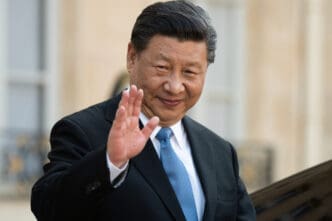Chinese President Xi Jinping engaged with a host of global business leaders on Friday, aiming to attract foreign investment amidst the intensifying trade conflict with the United States. The meeting took place just days ahead of U.S. President Donald Trump’s anticipated announcement of extensive tariffs affecting numerous international trading partners.
Emphasizing China’s potential as a lucrative environment for foreign enterprises, Xi addressed over 40 executives, including FedEx CEO Raj Subramaniam and Qualcomm chief Cristiano Amon, encouraging them to expand their investments in the country. “China has always been, is, and will remain an ideal, safe, and promising destination for foreign investment,” Xi asserted, according to the state-run Xinhua news agency.
Xi reiterated commitments to enhance market access, ensure equitable treatment for foreign businesses, and improve communication with international investors. He highlighted that foreign companies are crucial to China’s economy, contributing significantly to its imports, exports, and job creation. He urged multinational corporations, which he described as holding “significant international influence,” to resist regressive movements and support progressive actions.
In a subtle critique of Trump’s policies, Xi urged businesses to avoid actions that jeopardize the stability of global supply chains, stating, “Blocking others’ paths will ultimately only obstruct your own. Decoupling and breaking supply chains harm everyone and lead nowhere.” Executive attendees included Daimler AG’s Ola Källenius, Sanofi CEO Paul Hudson, and HSBC CEO Noel Quinn, among others.
The meeting followed the China Development Forum, where Chinese Premier Li Qiang encouraged international businesses to resist protectionism amidst global instability. Li emphasized China’s preparedness for external shocks, hinting at the geopolitical tensions impacting the economic landscape.
In a separate engagement, Apple CEO Tim Cook promised to enhance investment in China’s supply chain, research, and social welfare sectors. Chinese Commerce Minister Wang Wentao criticized U.S. tariffs, which he argued disrupt business operations and add uncertainty to the global economy, yet expressed China’s readiness to foster a more stable policy environment in collaboration with the U.S.
Despite multiple challenges, including a struggling property sector and weak consumer spending, China aims for a 5% economic growth rate this year. However, a 20% decline in foreign direct investment (FDI) in the year’s first months underscores the urgency of attracting international capital.
With geopolitical tensions and increased national security regulations fueling the outflow of foreign business, China’s leadership is actively courting both foreign and domestic investors. Last month, Xi met with prominent Chinese business leaders to foster confidence in private enterprise growth opportunities.
China’s growth ambitions are further threatened by renewed trade frictions with the U.S. President Trump has already imposed additional tariffs on Chinese imports and hinted at more measures. In response, China has levied duties on select U.S. goods and enacted new export controls. Enhancing its legal framework, China announced the enforcement of its anti-sanctions law to counteract discriminatory foreign measures.
As the U.S. prepares to unveil new reciprocal tariffs against various countries, these actions aim to rejuvenate domestic manufacturing and address perceived trade imbalances. Yet, Trump has expressed a willingness to negotiate with China, suggesting potential high-level talks in the near future.
The Bigger Picture
The ongoing trade tensions between China and the United States carry significant implications for global markets and local economies. For multinational corporations, navigating these turbulent waters requires strategic foresight as supply chain disruptions and regulatory changes demand acute agility and adaptability.
For consumers, the ramifications of this trade war may manifest in increased prices for goods reliant on international trade, particularly those sourced from China or the U.S. Additionally, economic uncertainty could impact job markets, investment opportunities, and financial stability in regions heavily dependent on international trade relations.
Communities worldwide may experience shifts in economic priorities and policies as governments respond to the evolving trade landscape. In the long term, these tensions could reshape the global economic order, highlighting the importance of international cooperation in fostering resilient and sustainable economic growth.








